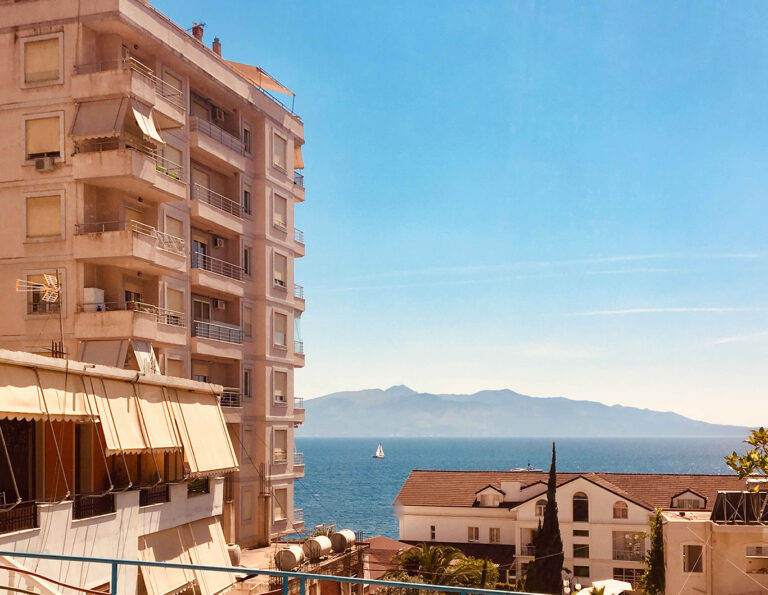We had been on the coach all day, bumping along the road to Albania’s coast. For the last hour, the bus had climbed and then descended a steep mountain via hairpin bends towards the seaside resort of Sarandë. Finally we emerged from trees and I had my first view of the Corfu Channel and the famous Greek island after which it is named.
I was in Sarandë as part of a journey across the entire length of the old Iron Curtain, from Norway to Azerbaijan. I took this photograph from the coach. For over forty years, the Iron Curtain ran invisibly through the water between Albania and the island of Corfu, dividing East from West, causing deep mistrust and loss of life, and demonstrating just how complex and varied the Cold War could be.
In the West were the capitalist countries, most of which had representative democracies; in the East were the socialist democracies, one-party states with Marxist governments that were heavily influenced by, and mostly controlled from, the Soviet Union. For four decades, to cross the Curtain was always a political act, and, for tens of millions of people living in the East, mostly impossible.

I sat outside the house where I had rented a room, just to the left of this image, and spoke to Ervin, the owner’s son. He told me that it had been impossible for Albanians to cross this narrow stretch of water until the 1990s, and shared his take on the country’s wider fate under communism. ‘This part of Albania’s coast is famous for mussels,’ he said. ‘But it was completely illegal for Albanians to eat them. Only once was my grandfather lucky enough to get hold of some. But the family had to enjoy them in absolute secrecy or else all of them could have gone to prison.’ This was because the Albanian government had decreed that all mussels had to be exported to earn foreign currency for the country. Television signals from the West could easily be picked up in Sarandë. Yet under communism locals had to watch with the sound turned off. This, he said, was ‘to avoid denunciation and prison’.
Prison for watching TV and eating shellfish? It was extreme even by the standards of communist Eastern Europe. But it was the daily reality of Albania under Enver Hoxha’s dictatorship.
The part of the Iron Curtain we remember most often ran through Europe’s centre: the frontier of East and West Germany and the borders that Austria and Italy shared with Czechoslovakia, Hungary and Yugoslavia. However, the Curtain split the entire continent, from northern Norway, deep inside the Arctic Circle, to the USSR’s meeting point with Turkey.
Albania’s communist rulers were always among the world’s harshest. So much so that Hoxha not only hated the West but also fell out with all other socialist states because they were not fierce enough. From the mid-1950s, Albania was the most isolated country in Europe.
Its overflowing prisons were harsh labour camps, where inmates frequently died. Private enterprise of all kinds was outlawed; even the private ownership of chickens was banned for a time. Senior government ministers were executed if they fell under the cloud of Hoxha’s paranoid suspicion, even as late as the 1980s, when most other communist states had long since given up such Stalinist practices. Infamously, Albania’s striking landscape became strewn with mushroom-domed nuclear bunkers, perhaps as many as 750,000. Thousands remain to this day, including one in the centre of Sarandë.
In October 1946, two British Royal Navy ships were blown up by Albanian mines. The Albanians had secretly laid the mines with the express intention of preventing Western vessels from using the strait, despite it being a long-established international shipping lane. Forty-four British sailors were killed.
In the years following, MI6 and the CIA tried repeatedly to oust Hoxha, landing guerrillas on the Albanian coast and trying to guide them by radio transmitter from a mansion in Corfu. Every operation ended in failure for the West and Hoxha continued as leader until his death from natural causes in 1985.
Today, Sarandë is a resort that attracts visitors from across Europe. I noticed it seemed to be especially popular with Swedish tourists during my own stay. One can come to enjoy the sun and the bathing and hardly notice the country’s difficult history. Yet all the locals I met, both old and young, still carry the imprint of those times. Albania still struggles economically. Albanians continue to feel like pariahs when they visit other countries. The 1946 Royal Navy attack is still taught in every Albanian school, despite almost no one in the United Kingdom remembering it. As I found in many other places I travelled to, the Iron Curtain continues to cast long shadows more than three decades after its collapse.
Photography courtesy of the author
Timothy Phillips is the author of The Curtain and the Wall: A Modern Journey along Europe’s Cold War Border, published by Granta Books in October 2022.







